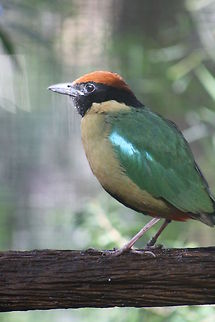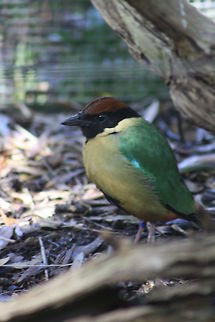
Appearance
The Noisy Pitta is a colourful bird. It has a black head and nape of neck with a chestnut crown. The wings are green with a turquoise front edge and the back is also green. The throat, breast and belly are lemon yellow. The tail is black and the under-tail coverts are orange-red.
Distribution
The Noisy Pitta is found in forest habitats near the east coast of Australia. Its range extends from the northern tip of Queensland southwards to the New South Wales/Victoria border. It occurs mainly in rainforest but is also sometimes found in drier woodland.Status
The Noisy Pitta has a wide range and is believed to be fairly common in suitable habitats in Queensland. It is listed as being of "Least Concern" by BirdLife International in the Red List of Threatened Species. It may be diminishing slightly in number because of habitat destruction but probably not at a rate high enough to justify raising its status to "Near Threatened".Behavior
The Noisy Pitta is a bird of the forest floor where it rummages through the leaf litter for the insects, woodlice, snails and other invertebrates on which it feeds. It bobs its head up and down and flicks its tail from side to side while it forages. Its diet includes some fruit and it cracks open the shells of molluscs such as the giant panda snail on an anvil, a stone or other hard surface habitually used for this purpose.It nests in a concealed location on the ground, laying about four eggs in early summer. It is a shy bird and its distinctive call is heard more often than the bird is seen. The call is usually repeated twice and consists of a sequence of three ascending notes, sometimes rendered as "walk-to-work".
Habitat
The Noisy Pitta is found in forest habitats near the east coast of Australia. Its range extends from the northern tip of Queensland southwards to the New South Wales/Victoria border. It occurs mainly in rainforest but is also sometimes found in drier woodland.References:
Some text fragments are auto parsed from Wikipedia.